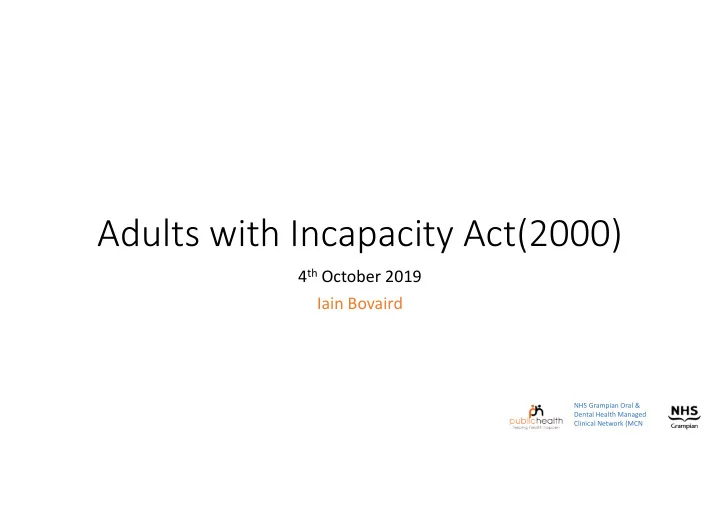

Adults with Incapacity Act(2000) 4 th October 2019 Iain Bovaird NHS Grampian Oral & Dental Health Managed Clinical Network (MCN
Learning outcomes • To allow participants to understand the relevant principles of the adults with incapacity act. • To inform participants of the paperwork required for the treatment of an adult with incapacity. • To introduce the 5 principles of treatment planning for an adult who does not have capacity
Helpful Websites Adults with Incapacity (Scotland) Act 2000: A short guide to the Act www.gov.scot/Publications/2008/03/25120154/1 The Law - Adults with Incapacity Scotland https://www.mwcscot.org.uk/the-law/adults-with-incapacity-act
What is the Adults with incapacity act? • The Act introduced a system for safeguarding the welfare and managing the finances and property of adults (age 16 and over) who lack capacity to act or make some or all decisions for themselves because of mental disorder or inability to communicate due to a physical condition
• Guardianship order (Part 6 of the Act). Guardianship can cover property and financial matters or personal welfare, including health, or a combination of these. • Power of Attorney can be welfare, continuing or both and is given by the individual when they have capacity
• Medical treatment decisions (Part 5 of the Act). The Act allows treatment to be given to safeguard or promote the physical or mental health of an adult who is unable to consent. The principles apply to medical treatment decisions as to other areas of decision-making. Where a welfare attorney or guardian has been appointed with health care decision-making powers the doctor must seek his/her consent where is it practicable and reasonable to do so.
Principles to be followed • The Act aims to protect people who lack capacity to make particular decisions, but also to support their involvement in making decisions about their own lives as far as they are able to do so. • Anyone authorised to make decisions made on behalf of someone with impaired capacity must apply the following principles:
My Brain of benefit to the patient Least restrictive option Take account of the wishes of the Consultation person with Relevant others Encourage The use of existing skills and development of new ones
• Principle 1 – Benefit • Any action or decision taken must benefit the person and only be taken when that benefit cannot reasonably be achieved without it.
• Principle 2 - least restrictive option • Any action or decision taken should be the minimum necessary to achieve the purpose. It should be the option that restricts the person's freedom as little as possible
. • Principle 3 - take account of the wishes of the person • • In deciding if an action or decision is to be made, and what that should be, account must be taken of the present and past wishes and feelings of the person, as far as this may be ascertained. Some adults will be able to express their wishes and feelings clearly, even although they would not be capable of taking the action or decision which you are considering. For example, he/she may continue to have opinions about a particular item of household expenditure without being able to carry out the transaction personally. • The person must be offered help to communicate his or her views. This might mean using memory aids, pictures, non-verbal communication, advice from a speech and language therapist or support from an independent advocate. A Guide to Communication and Assessing Capacity is available at: http://www.scotland.gov.uk/Publications/2008/02/01151101/0
• Principle 4 - consultation with relevant others • Take account of the views of others with an interest in the person's welfare. The Act lists those who should be consulted whenever practicable and reasonable. It includes the person's primary carer, nearest relative, named person, attorney or guardian (if there is one).
• Principle 5 - encourage the person to use existing skills and develop new skills • Not always the easy or straight forwrd, or indeed popular approach
Recommend
More recommend